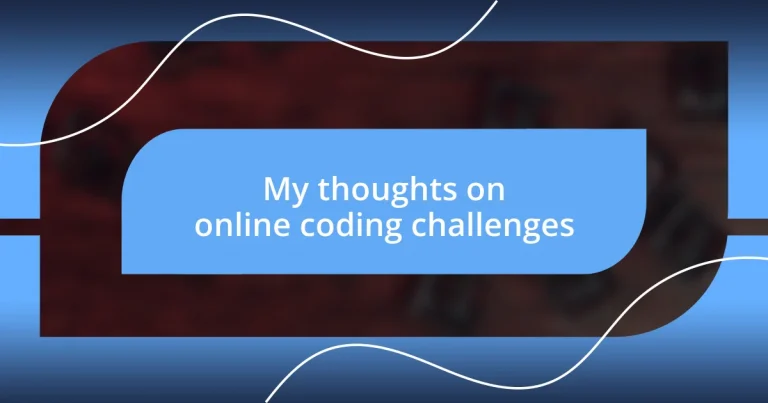Key takeaways:
- Online coding challenges enhance problem-solving skills, creativity, and adaptability, while providing immediate feedback to refine approaches.
- Participating in coding challenges can boost resumes by demonstrating technical proficiency and commitment to continuous learning, while also increasing self-confidence.
- Building a structured coding routine, setting specific goals, and varying challenge types can enhance the learning experience and maintain engagement in coding practice.
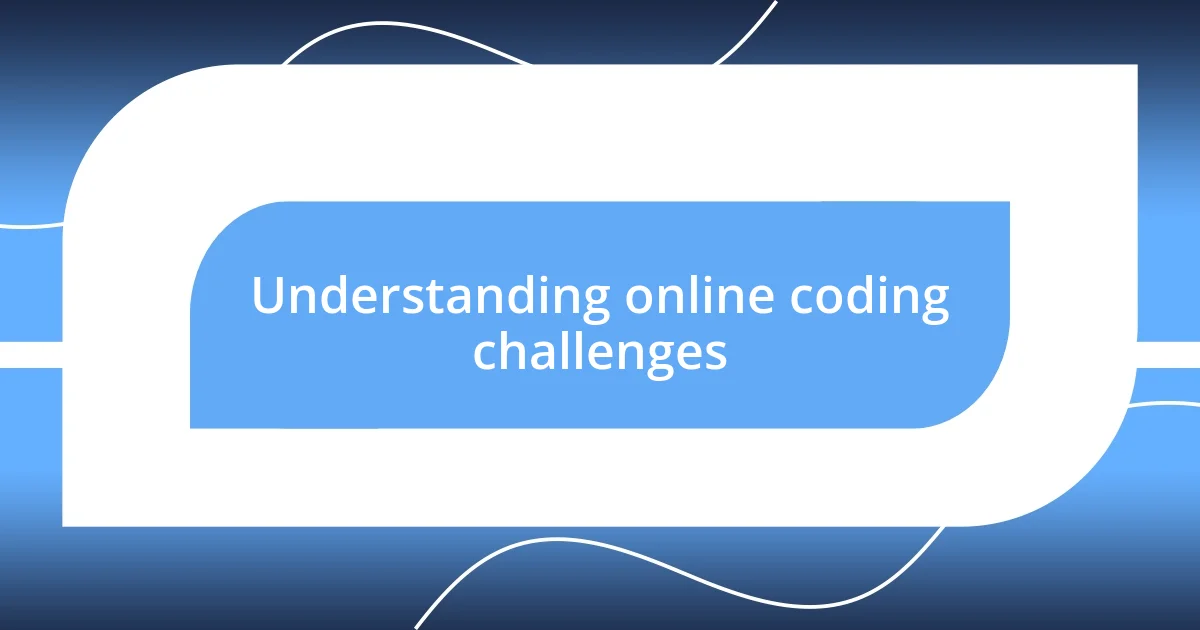
Understanding online coding challenges
Online coding challenges can feel like a double-edged sword. On one hand, they’re an excellent way to practice and sharpen your coding skills, but I remember my first experience—nervous and overwhelmed by the timer ticking down. Have you ever found yourself in a similar situation, feeling the pressure to perform while trying to solve a complex problem?
These platforms not only test your coding ability but also your problem-solving skills under time constraints. I often find that tackling these challenges allows me to view problems from different angles, enhancing my creativity and adaptability in coding. It’s fascinating how, sometimes, a simple algorithm boils down to understanding the problem properly before jumping in.
Furthermore, the immediate feedback is invaluable. I appreciate being able to see where I went wrong, which has helped me refine my approach over time. And let’s be honest, what’s more satisfying than watching that little success message pop up after a well-executed solution? It’s moments like those that remind me why I love coding in the first place.
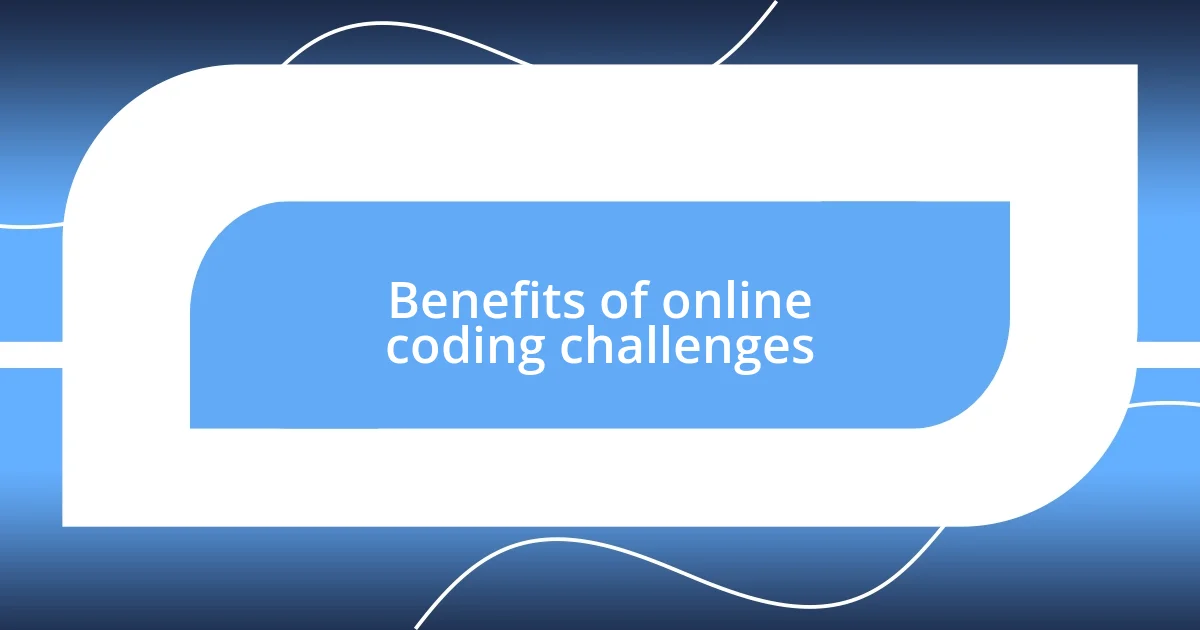
Benefits of online coding challenges
Online coding challenges offer a unique opportunity to improve your skills while enjoying a bit of friendly competition. I remember joining a coding competition for the first time; the adrenaline rush pushed me to think outside the box. Competing against others inspired me to push my limits and strive for better results, which is something I still carry with me today.
Moreover, these challenges can significantly boost your resume. As I navigated through various coding platforms, I noticed how potential employers value the skills demonstrated through these challenges. They not only reflect technical proficiency but also a commitment to continuous learning and problem-solving under pressure. I’ve had recruiters mention these achievements in conversations, which made me realize just how much they can enhance career prospects.
Finally, working through online coding challenges can be a real confidence booster. I still recall when I solved a particularly tough problem that had stumped me for hours. That moment of clarity and success was exhilarating, reinforcing my belief in my abilities. With each successful challenge, I felt more empowered to take on complex projects, both personally and professionally.
| Benefit | Personal Experience |
|---|---|
| Skill Improvement | Enhanced creativity and problem-solving. |
| Resume Value | Demonstrates commitment and proficiency to employers. |
| Confidence Boosting | Successfully solving challenges enhances self-belief. |
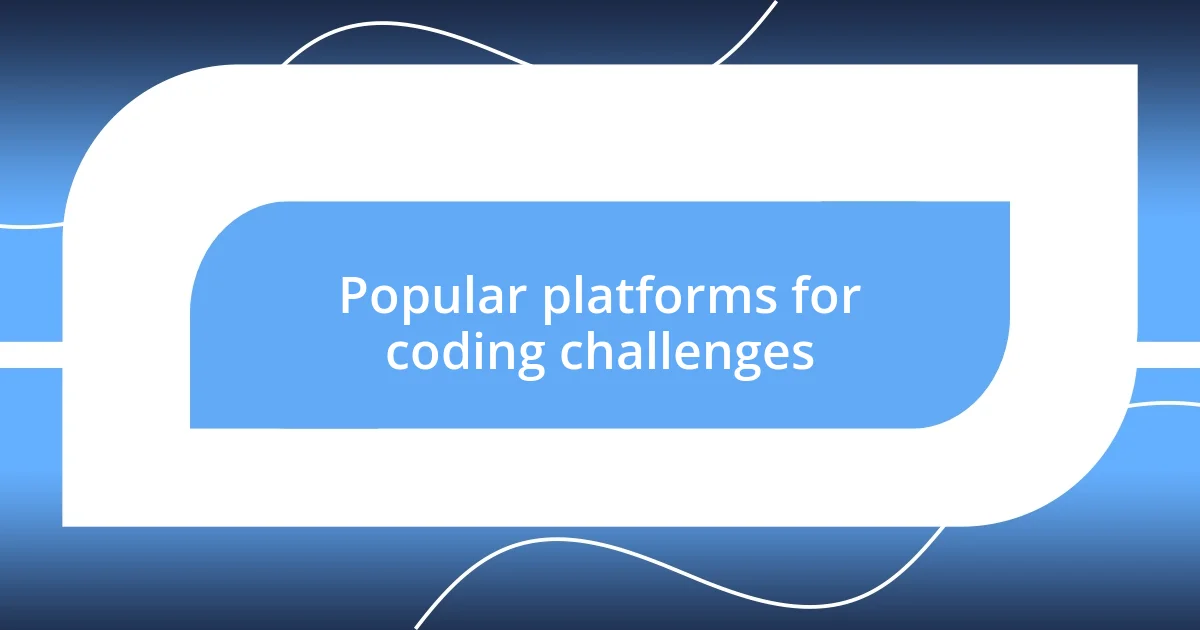
Popular platforms for coding challenges
When it comes to popular platforms for coding challenges, there are several that stand out in my experience. Each has its own unique flavor and community vibe. I remember the first time I logged onto LeetCode; the interface immediately felt user-friendly, and it had a vast library of problems that catered to all skill levels. The thrill of tackling those algorithmic puzzles kept me returning day after day.
Here are a few platforms I often recommend:
- LeetCode: Great for practicing coding interviews and honing algorithms.
- HackerRank: Offers challenges across various domains, from algorithms to AI.
- Codewars: I loved the gamified experience here; it made learning fun through ‘kata’ challenges.
- CodinGame: This platform combines coding with gaming, creating a fun and interactive approach.
- TopCoder: Known for competitive programming; I found participating in contests to be exhilarating.
Exploring these platforms has been a journey of discovery for me. Sometimes, I get so lost in solving a problem that I lose track of time, which speaks to how engaged I feel. Just the other day, I was on HackerRank attempting a particularly tricky problem, and the sense of achievement when I cracked the solution was unforgettable. It reinvigorated my passion, reminding me why I dove into coding in the first place. Each platform offers something unique, transforming the learning experience into an enjoyable adventure.

Analyzing your performance in challenges
Evaluating performance in coding challenges is vital for growth. I often analyze my results after completing a challenge, focusing on where I excelled and the areas needing improvement. For instance, when I struggled with a problem, I made it a point to revisit similar challenges to strengthen those weak spots.
It’s interesting how tracking my performance over time reveals patterns I might miss in the heat of the moment. I recall keeping a personal log of my challenge outcomes, noting not just the success rate but the time taken for each problem. This reflection not only highlighted my progress but also helped me identify which types of questions tend to trip me up, guiding my future practice sessions.
Moreover, I find discussing my performance with fellow coders incredibly insightful. Sharing struggles and victories fosters a sense of community and learning. It’s a bit like going through a workout routine together—it’s motivating! Have you ever considered how discussing your challenges could uncover new strategies for improvement? Engaging in such conversations not only broadens my perspective but often leads to discovering solutions I hadn’t considered before.
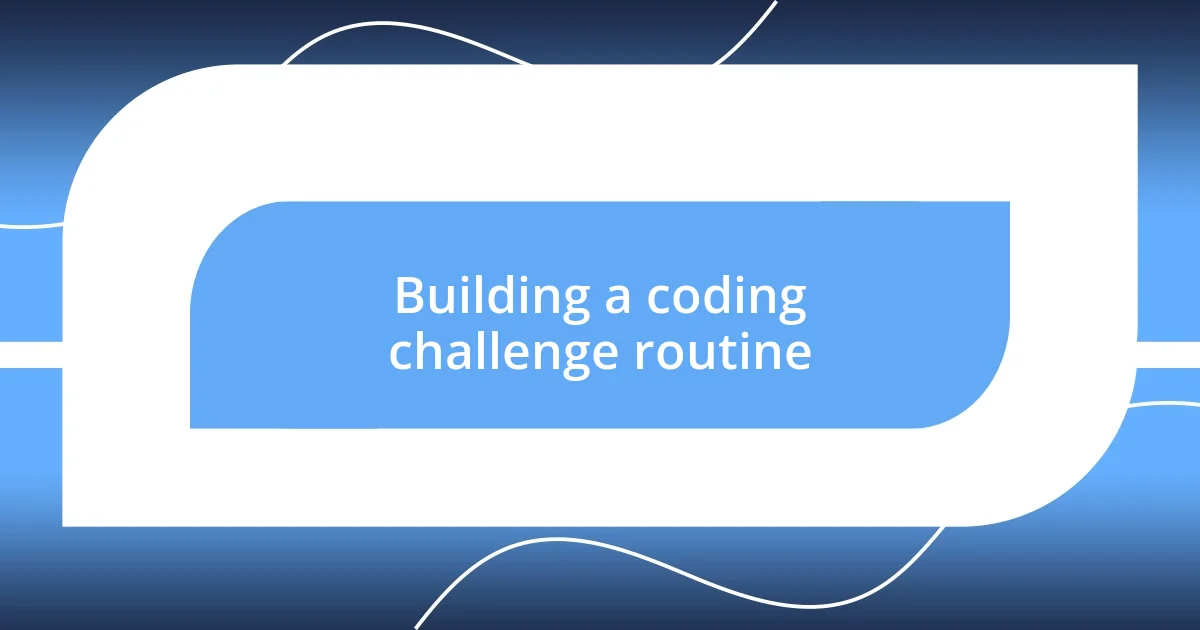
Building a coding challenge routine
Building a coding challenge routine goes beyond just solving problems; it’s about creating a sustainable practice that fits into your lifestyle. When I first started, I committed to tackling one challenge each day for 30 days. It seemed daunting at first, but putting it into my schedule made it a non-negotiable part of my day. Looking back, it was a game changer—turning it into a daily habit helped me build momentum and boosted my confidence.
One of the most effective techniques I’ve found is setting specific goals for each session. Initially, I aimed to simply complete a challenge, but as I progressed, I shifted my focus to understanding the underlying concepts. I remember the day I finally solved a dynamic programming problem after getting stuck for hours. The exhilaration of not just finding a solution, but truly comprehending the “why” behind it was immensely rewarding. Have you ever paused to think about how breaking down your goals could enhance your learning experience?
Another aspect I’ve integrated into my routine is variation. I make it a point to switch up the types of challenges—one day it might be algorithms, while another day could focus on data structures. This keeps things fresh and prevents burnout. It’s like mixing up my workouts; not only does it keep me engaged, but it also exposes me to a wider range of scenarios, preparing me better for real-world coding challenges. Have you tried varying your approach yet? Finding joy in the diversity of problems has helped me remain enthusiastic and committed to my coding journey.












